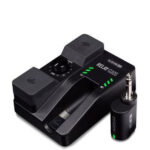Navigating the world of bass guitars can be exciting, especially when you’re on the hunt for a new instrument. Recently, I found myself in a classic bassist’s predicament, torn between two compelling options at PMT Bristol: the Jackson JS2 Spectra Bass and the Ibanez SR300EB Bass. Both promised a solid foundation for my low-end aspirations, but each presented a unique set of features and playability that warranted a closer look.
[  Jackson JS2 Spectra Bass Guitar Tobacco Burst ]
Jackson JS2 Spectra Bass Guitar Tobacco Burst ]
The Ibanez SR300EB, a familiar name in the bass community, had already garnered praise from online reviews and YouTube demos. Its reputation for versatility and sleek design preceded it. However, the Jackson JS2 Spectra, a bass I was less acquainted with, emerged as a surprise contender during my in-store exploration. Despite its simpler control layout, the Jackson bass immediately impressed with its inherent playability.
The Ibanez, true to its word, boasted a wider array of tonal possibilities, thanks to its multiple knobs and active EQ system. For bassists who love to sculpt their sound and experiment with different sonic textures, this was a definite advantage. Conversely, the Jackson Spectra opted for a more streamlined approach with just three control knobs. Yet, what it lacked in knob count, it compensated for in pure, unadulterated playing feel. The neck felt comfortable in hand, and despite a slightly high action which is easily adjustable, the Jackson bass resonated with a natural, inviting quality.
Price also played a role in this bass battle. The Jackson JS2 Spectra held a price advantage, making it an even more attractive option for budget-conscious players. If both basses were priced identically, the Ibanez might have edged ahead initially due to its feature-rich nature. But the Jackson’s affordability, combined with its surprising playability, leveled the playing field considerably.
[  Ibanez SR300EB Weathered Black Bass Guitar ]
Ibanez SR300EB Weathered Black Bass Guitar ]
One recurring observation during my instrument testing at PMT was the consistent lack of proper setup. Both the Jackson and Ibanez basses exhibited some fret buzz, particularly on the lower frets of the E string. While this might be a common occurrence in retail settings, it’s worth noting for potential buyers. A basic setup, including truss rod adjustment, could likely resolve this issue. However, it does raise a question about factory conditions versus retail preparation. On a positive note, both basses seemed reasonably well-intonated straight off the rack, suggesting a solid foundation despite the setup imperfections.
For bass players in the market for a new instrument in this price range, exploring beyond these two models is always recommended. The musical instrument landscape is vast, and personal preference plays a significant role in choosing the right bass. While my time was limited during this particular shopping trip, online retailers and local stores offer a wide selection to consider.
My past experience with a different brand, where setup issues led to significant fret buzz and ultimately a return, highlights the importance of playability and setup quality. While that particular incident involved a different make and model, it underscored the value of finding an instrument that feels right and is free from fundamental flaws.
Ultimately, the choice between the Jackson JS2 Spectra and the Ibanez SR300EB, or any other bass in this category, boils down to individual priorities. If tonal versatility and a wealth of features are paramount, the Ibanez SR300EB is a strong contender. However, if pure playability, straightforward design, and affordability are key factors, the Jackson JS2 Spectra bass guitar emerges as a surprisingly compelling alternative. Further research, in-person testing, and considering your own playing style will be crucial in making the final decision and finding the perfect bass to fuel your musical journey.

